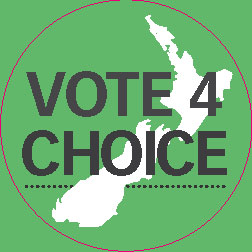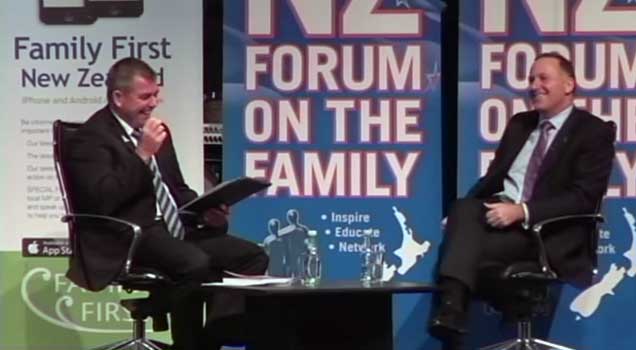 Bob McCoskrie of Family First NZ interviewed the Prime Minister John Key earlier this month at the 8th annual NZ Forum on the Family. They discussed a range of issues including marriage equality, “smacking”, “euthanasia”, prostitution, decriminalising marijuana and, yes, abortion. The whole video is on YouTube (and the abortion discussion starts around 29 minutes). We thought you might be interested in our transcript of that part of the discussion.
Bob McCoskrie of Family First NZ interviewed the Prime Minister John Key earlier this month at the 8th annual NZ Forum on the Family. They discussed a range of issues including marriage equality, “smacking”, “euthanasia”, prostitution, decriminalising marijuana and, yes, abortion. The whole video is on YouTube (and the abortion discussion starts around 29 minutes). We thought you might be interested in our transcript of that part of the discussion.
Bottom line: John Key says he opposed liberalising abortion law because it would encourage people to treat abortion as contraception. Sigh! (See highlighted passages).
Bob McCoskrie: The Greens say that an unborn child at 19 weeks can be aborted but an unborn child at 20 weeks cannot be, because they’ve said there’s a 20-week cut-off. There’s this argument about where does the right for a woman to have an abortion against the right of an unborn child to life. Where do you put that point at?
John Key: If you look at the current law and accept that there will be lots of interpretations within that law so there are as you probably know because you know more about it than I probably ever will, but if you look at that law, there’s lots of situations where an abortion is legally acceptable.
BM: But effectively it is abortion on demand we have in New Zealand isn’t it – 99 percent of abortions are approved.

Bob McCoskrie of Family First NZ and Prime Minister John Key at the NZ Forum on the Forum earlier this month.
JK: My guess is that’s probably right, a) because of the stats that you quote and b) while in theory there are examples that say ‘well it’s under this – it’s under 20 weeks gestation period but then it sort of goes into if there was a parent, sibling, orwhatever it is – there’s various legal things – but in the end I think it’s about the impairment on the mother and the child so in reality yes. So the reason I’m opposed to changing the law is that again, I think the law broadly works; I accept that it’s likely that the bulk of people that are terminating pregnancy are probably doing so on the basis that they – it’s an unwanted pregnancy and they feel that they can’t cope or don’t want to at that point in their life raise a child. So I think the issue there is that if you went to further liberalisation my concern I think would be that people would see that as a legitimate contraception device in a way that all of a sudden they would be more encouraged to go down that path and be less careful, so I’d be opposed to that.
But equally on the other side, I suppose my only point is that if you accept that there are probably plenty of 19-year-old girls that wander in and say I’m having – you know, I’m pregnant and I want to have an abortion and in the end they have that abortion, what would be the counter argument? And the counter argument might be that what is fundamentally a very young woman is raising a child and feels both mentally, financially and physically uncapable (sic) of raising that child and if you cast your mind back to the debate we had a little bit earlier, why do we think marriage is the best forum, putting to one side the legality of it, it’s because actually we know when you raise a child that is an immensely challenging thing to do. If you’re really going to raise a child well, children always through curveballs at you in my experience at every step along the way and actually if you don’t have someone to bounce that off against, it’s a lonely quite difficult process to go through. Lots of people do it and they do it very well. My mother did it by virtue of the fact that my father died when I was pretty young, but the reality is if you’ve got somebody else to bounce it off against and to support you and to play the different roles that have to be played, then that’s really beneficial. And I suppose my only point would be if abortion laws went the other way you would without doubt have more young people having children and the question is would they be in the best situation to cope with that if by definition they’re saying at the moment they can’t.
BM: Would you support better informed consent though because the concern is that vulnerable women are being counselled by the people who are also providing the abortion. They’re also not seeing the fetal development to understand what is – I mean if you’ve had an operation you know that they go through all the risks, they show you every scan, you sign waivers, that’s not necessarily the case with abortion, so would you support more information for women so they’re making an informed decision?
JK: In principle yes and in principle. My preferred position is that for young women parental notification is sought.
BM: Yeah, you’ve always supported that. Why haven’t you moved on that because that always came across as it’s not necessarily an abortion argument, it’s actually a parental role argument.
JK: I think in the end you know if your 16-year-old daughter turns up and she’s pregnant then in the end a whole lot of thoughts are going to be going through her mind, the capacity to actually cope with that situation and to actually make a sensible choice, whatever the sensible choice might be for their family and for the wider family unit. And actually one thing we know about young people is they’re terrified when they make a mistake, they often think there’s no coming back from a mistake and actually truthfully there is, because all young people will make mistakes of some sort whatever it might be.
BM: Which is all the more reason for parents to be involved, isn’t it.
JK: That’s my view, so the only legal argument around not having that as an automatic right is just the fear that that could put at risk those young people – that’s always a subjective call.
BM: And I think Judith Collins actually allowed for that by being allowed to apply to the Family Court for the exemption. So once again, I guess I go back to the question: Why hasn’t the government moved on that one because it seems to be one that the National Party could get in behind?
JK: I think it would take an overall reform of abortion law, and once you get into that space again you’re get into an area…
BM: Well it’s actually under the Care of Children Act.
JK: Yeah, Care of Children Act but – you could do it. It may become a conscience issue, I don’t really know but probably not I would have though but just in general that’s our preferred position yeah.
BM: I thought it was a conscience issue at the time.
***************
CLICK HERE TO DONATE
TO HELP US CONTINUE OUR PRO-CHOICE WORK
